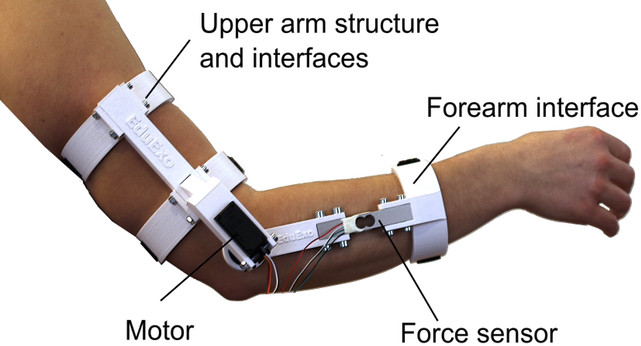Robotic exoskeletons are used for medical purposes such as helping with the rehabilitation of stroke patients, or enable paraplegics to walk again, as well as in the work place to assist people lifting heavy objects. While it’s possible to learn about the theory about exoskeleton technology, practical experience may help grasping all concepts better. However, there are not many courses available, and exoskeletons are usually expensive, so
 The EduExo hardware is based on off-the-shelf components like an Arduino UNO board, a motor, and a force sensor, as well as a rigid exoskeleton structure and cuff interfaces. The latter is optional as you can get the kit without it, and will instead receive the STL files to 3D print the parts yourself.
The EduExo hardware is based on off-the-shelf components like an Arduino UNO board, a motor, and a force sensor, as well as a rigid exoskeleton structure and cuff interfaces. The latter is optional as you can get the kit without it, and will instead receive the STL files to 3D print the parts yourself.
There’s also a handbook to help you get started in several steps:
- Exoskeleton Introduction
- Mechanics and Anatomy – Theory + instructions to assemble the kit
- Electronics and Software – Theory + instructions to connect electronic components and write basic software with the Arduino IDE
- Control Systems – Theory explaining the behavior of the exoskeleton, and step by step instructions to implement and test the control systems with the kit.
- Virtual Reality and Video Games – Learn how to create a computer game, connect the exoskeleton to your computer (Windows PC) and use it as a game controller. The demo relies on Unity 3D engine
- The Muscle Control Extension – You can reproduce your arm movements with the kit using an electromyography-EMG sensor (sold separately)
One you’ve gone through the handbook, you should understand the basics of exoskeletons, and maybe try develop your own algorithm or programs. Note that’s it’s just an educational device, it’s not powerful enough to provide any kind of support.
EduExo has been launched on Kickstarter with a 8,000 CHF ($7,939 US) funding goal. A 15 CHF pledge will get you the e-handbook only. If you have a 3D printer and most of the components, 30 CHF should get you the handbook, 3D STL files, and the components list. A full kit with all parts and a printed handbook requires a 165 CHF pledge (early bird). If you want to play with the Muscle Control Extension part, you’d need to spend $250 for the full kit plus the EMG sensor. You may also learn more about the educational kit and exoskeletons in general on EduExo website.
Via Arduino blog

Jean-Luc started CNX Software in 2010 as a part-time endeavor, before quitting his job as a software engineering manager, and starting to write daily news, and reviews full time later in 2011.
Support CNX Software! Donate via cryptocurrencies, become a Patron on Patreon, or purchase goods on Amazon or Aliexpress





DARPA has already been testing battery powered exoskeletons on “real life” soldiers, so there is clearly potential for a skillful “garage” inventor and entrepreneur to learn with these kits and develop [and make money from] the technology for a more-powerful, more efficient military warrior. (See exoskeleonreport dot com for more information about all the different categories that exoskeletons can play in the military and help win the “War On Terrorism.”)